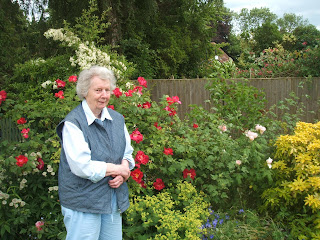The mysterious nature of the source of inspiration and ideas for writing is a constant subject for debate – especially, perhaps, among those who do not write. Those who do write are probably just thankful that ideas do come to mind, and don’t spend a lot of time analysing where they spring from. Such analysis can be fun, though, if it isn’t overdone.
‘Where do you find ideas?’ is such a common question at book talks that I once wrote a short story with that title. It’s not a very well known story, but I much enjoyed putting it together – and it became the title story in my one - and so far only - collection of short stories.
When I told Margaret Yorke I was featuring The Small Hours of the Morning in this blog, she told me: ‘my plan was to have a sort of La Ronde where each character linked to the next one going in a circle and also the heroine had no physical contact with a soul, not a touch..I must read it, don't remember the details’
I was very interested in this. The La Ronde idea strikes me as a very good one. And I wasn’t in the least surprised that Margaret didn’t remember the details of a book she wrote 35 years ago. Non-writers may imagine that writers retain in their heads all the nuances of books they have written, but it simply is not so. I forget some of the aspects of my early books, that’s for sure. But it can have a positive effect. When Suspicious Minds was finally published in the US, more than 15 years after it was written, I re-read it and was, oddly enough, very pleasantly surprised! It seemed to have rather more merit than I’d remembered...
Saturday, 24 July 2010
Writing Ideas and Inspiration
Friday, 23 July 2010
Forgotten Book - The Small Hours of the Morniing

My choice for today’s entry in Patti Abbott’s series of Forgotten Books is The Small Hours of the Morning, by Margaret Yorke. When I decided to pick one of Margaret’s books, I had a couple of dilemmas. First, I’m not sure it’s fair to describe them as ‘forgotten’, since she still has a substantial and devoted readership, even though she has not published a novel for several years. Second, which to choose? One of her strengths was achieving a very even (and high) standard of consistency with her stand-alone novels of psychological suspense, something which is far from common.
As a result, my choice of this particular novel was slightly random – there are a good may others I might have picked, and I may well feature some of them here in due course. But The Small Hours of the Morning does illustrate her gifts very well. Those gifts include swift and sure characterisation of ‘ordinary’, but interesting people, confident plotting and an ability to build suspense without sensationalism.
The book opens splendidly. The opening line is simple: ‘Cecil Titmuss was a careful man.’ A very well-organised chap, Cecil. But his wife June is discontented. She gets up in the night for solitary drinks of gin. And, although it is one o’clock in the morning, an un-named person is studying the Titmuss household through a pair of binoculars.
A great set-up is developed very neatly. Margaret Yorke increases the tension all the more effectively because of the very ‘normal’ ambience of the segment of society that she is depicting. Her insight into the subtle nuances of domestic life is deep, and she has always had a rare story-telling gift. This is one of many of her books that should not be forgotten.
I took the picture of Margaret, by the way, on a visit to her home last month. She was in great form and, as always, a delightful hostess. As on so many occasions, I reflected how lucky I am to have got to know personally writers whom I have long admired, and who prove to be terrific company in person.